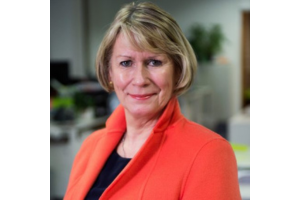Alison Johns is chief executive of Advance HE. Prior to autumn 2017 she was chief executive of the Leadership Foundation. She has worked in higher education for 25 years, including as head of policy for leadership, governance and management at HEFCE), where she established the Leadership Foundation and the Equality Challenge Unit. She is a past president of the Association of University Administrators and represents the UK on the Association of Commonwealth Universities Human Resources Management Network. She recently joined the British Council’s planning committee for Going Global, the major international higher education conference. Her international experience of higher education includes leading the review of teaching and learning for the Australian government which led to the establishment of the Office for Learning and Teaching.
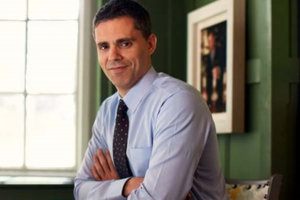
On July 10th 2023 WIUT welcomed an international observer to the Presidential election – Eduardo Ramos, Director of International and Professional Services of The Quality Assurance Agency (QAA) for Higher Education. The official visit was headed by Sarvarkhon Buzrukkhonov, the Deputy Minister of Higher Education, Science and Innovations of the Republic of Uzbekistan. The delegation had a welcoming tour on campus and met WIUT staff members to discuss collaborative opportunities between the QAA, Ministry and Westminster International University in Tashkent.
Eduardo is responsible for the portfolio of QAA’s international services, including the international membership services, accreditation, consultancy and QE-TNE (quality evaluation and enhancement of UK transnational education). He leads on international partnership building, ensuring the Agency continues to work with governments, agencies and institutions globally to benefit UK higher education and its international reputation.
Prior to this role, Eduardo worked on education internationalisation for Spanish agency ICEX-Invest in Spain, Audencia Business School in France, St George’s, University of London and Universities UK International. He holds degrees from the Autonomous University of Madrid and the UCL Institute of Education.
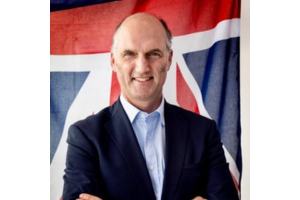
On January 10th, 2024, the Deputy Minister of Foreign Affairs of Great Britain, the Right Honourable Minister Leo Docherty, came to Uzbekistan on an official visit. During the visit, Minister Docherty and members of the British Parliament delegation, as well as British Ambassador to Uzbekistan, His Majesty's Ambassador, Timothy Smart, Country Director at British Council Uzbekistan Denise Waddingham visited Westminster Internation University in Tashkent (WIUT) - an accredited institution of the University of Westminster to meet with the Rector of WIUT Bakhrom Mirkasimov and First Deputy Minister of Higher Education, Science and Innovations of the Republic of Uzbekistan Komiljon Karimov.
Directions for developing future partnerships and education links between the UK and the Republic of Uzbekistan, including ways to support the Uzbekistan government's higher education priorities and the successful exemplar of the UK-Uzbekistan Transnational Educational (TNE) partnership and their further student and staff support measures were discussed. The visit ended with a nice campus tour.
Leo Docherty was a Minister of State (Minister for the Armed Forces) in the Ministry of Defence between 26 March 2024 and 5 July 2024.
He was a Parliamentary Under Secretary of State at the Foreign, Commonwealth & Development Office (FCDO) from 27 October 2022 to 26 March 2024.
He was previously Minister of State for Europe at the FCDO from 7 September 2022 to 27 October 2022. Leo was Minister for Defence People from July to September 2022. He was Parliamentary Secretary (Minister for Defence People and Veterans) for the Cabinet Office and the Ministry of Defence from April 2021 to July 2022. He was the MP for Aldershot from 2017 to 2024.
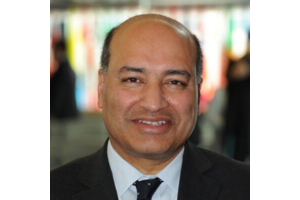
Sir Suma Chakrabarti was the sixth President of the European Bank for Reconstruction and Development (EBRD). Sir Suma served two terms as President, having been elected to the posts by the EBRD’s Board of Governors in 2012 and again in 2016. During his tenure at the EBRD, Sir Suma led the expansion of the institution’s geographical focus to the Middle East and placed greater stress on its less advanced countries of operation. While continuing with its private sector focused mandate, Sir Suma led the EBRD’s advocacy for market-friendly policy reform, better governance and improved investment climates, engaging personally with the political leaders of the EBRD’s countries of operation and the CEOs of private sector clients.
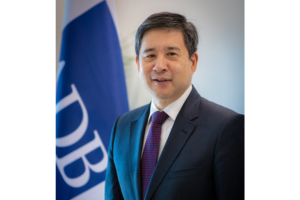
Asian Development Bank Chief Economist Albert Park delivered a presentation entitled “Transition to a Green Economy and Green Finance in Uzbekistan" at Westminster International University in Tashkent (WIUT). The event was also attended by the delegation of the University of Westminster in London.
Albert Park highlighted climate change vulnerability and the case for green energy transition in the Central Asian region. Participants discussed the transition to renewable energy sources, green energy zone initiatives and environmental sustainability policies and implementation strategies.
Mr. Park is the chief spokesperson for ADB on economic issues. He leads the Economic Research and Development Impact Department (ERDI), which publishes key knowledge products such as the Asian Development Outlook, Asian Economic Integration Report, Asia Bond Monitor, and Key Indicators for Asia and the Pacific.

Professor Jeffrey D. Sachs a world-renowned economics professor, bestselling author, innovative educator, and global leader and Advocate for the UN Sustainable Development Goals interacted with students, lecturers, staff and visitors at a forum held at Westminster International University in Tashkent (WIUT) on the morning of Wednesday 22 May. The office of Ms. Helena Fraser, United Nations Resident Coordinator for the Republic of Uzbekistan sponsored the visit and it was hosted by WIUT and its new Center for Policy Research and Outreach cpro.wiut.uz
Professor Sachs introduced the session with a discussion of the long history of civilizations and knowledge in Central Asia, and the Silk Road as the major center of trade and commerce until the advent of oceangoing vessels and marine routes to Asia and the Americas in the 16th Century.
In response to questions, he outlined four priorities for public and private investment in all countries: human capital, infrastructure, intellectual property, and mainstream business. Governments must not look to current jobs but create the jobs of the future to become relevant in a global economy. Sustainability is ultimately the result of a well-functioning mixed economy where public, private, and non-profit sectors play their part in measure.
Rather than depending on extractive industries that are not sustainable in the long term, he encourages countries to invest in renewable energy and a new Silk Road where it can again become a regional center for finance, information, transport, and tourism. The depletion of the Aral Sea is a difficult lesson for the region and it must prioritize climate-friendly development to avoid the devastation of a hotter and drier future.
Professor Sachs was twice named among Time magazine’s 100 most influential world leaders and has received 28 honorary degrees. The New York Times called Sachs “probably the most important economist in the world,” and Time magazine called Sachs “the world’s best-known economist.” A survey by The Economist ranked Professor Sachs as among the three most influential living economists. To learn more see jeffsachs.org

On 20 September 2019, United Nations (UN) Special Rapporteur on the independence of judges and lawyers Mr. Diego García-Sayán visited Westminster International University in Tashkent (WIUT) to meet with students and faculty of WIUT, University of World Economy and Diplomacy (UWED), Tashkent State University of Law (TSUL), Uzbek Academy of the General Prosecutor's Office and The Academy of Ministry of Internal Affairs (MIA) of the Republic of Uzbekistan. The event was organized in collaboration with The National Human Rights Centre of the Republic of Uzbekistan.
Mr. García-Sayán`s meeting with students and faculty was a part of his official visit to Uzbekistan from 19 to 25 September 2019. The purpose of the first visit of the Special Rapporteur to the country is to assess the measures adopted by the government to protect and promote the independence of judges and lawyers, as well as prosecutors.
“Within the justice system, judges, lawyers and prosecutors must be free to carry out their professional duties and must be protected, in law and in practice, from any threats, interventions or pressure as they carry out their professional activities”, said Mr. García-Sayán.
During the session, Mr. García-Sayán shared with students his professional experience, answered their questions, including the importance of qualified future lawyers with knowledge and practice of domestic and international law; the importance of gender balance in justice system.

On 26 March 2019, Chief Economist of European Bank for Reconstruction and Development (EBRD) - Dr. Sergei Guriev visited WIUT. As the EBRD’s Chief Economist, Dr. Guriev is responsible for advising the President and other senior members of the Bank’s management team on economic issues of strategic or operational relevance pertaining to the EBRD region. The aim of his visit to WIUT – presentation of EBRD Transition Report 2018-19 “Work in Transition” (https://www.ebrd.com/transition-report-201819).
The Transition Report 2018-19 analyses the impact on work of demographic change, automation and migration, both across national borders and within countries.
How should governments respond to urbanisation, an ageing workforce or rising numbers of young people entering the labour market? The report also looks at ways to minimise the emigration of workers from poorer countries and better integrate migrants in richer ones.
And our annual analysis includes a macroeconomic overview of the EBRD regions and of structural reforms in the past year.

On 20th September, 2018, Westminster International University in Tashkent invited a guest speaker Mr. Wencai Zhang to speak about opportunities of upcoming projects on supporting horticultural activities, improving the water supply conditions in Tashkent province and the efficiency of Uzbekistan's railway operations. Mr. Wencai Zhang is the Vice-President of the Asian Development Bank and he is responsible for leading and overseeing the South Asian and Central-West Asian regions.
Since the partnership began in 1995, ADB and Uzbekistan have invested more than $5 billion in projects and programs designed to improve people’s lives. This has involved more loans to Uzbekistan than to any other country in Central Asia. ADB and Uzbekistan continue to work together on projects in transport and communications, energy, water supply, municipal infrastructure and services, and access to financial services. All of this is being done with an eye to ensuring the country’s economic growth is inclusive. (www.adb.org).
The Students and the staff of WIUT were involoved in debating on ADB upcoming projects, activities, economic development, opportunities in education and social sector.

On 22nd October 2019, Westminster International University in Tashkent (WIUT) had the privilege of hosting Mr. Abdoulaye Mar Dieye – UN Assistant Secretary-General and Special Advisor to the UNDP Administrator. Mr. Mar Dieye was accompanied by Mr. Ben Slay - Senior Advisor of UNDP Regional Bureau for Europe and the CIS (RBEC) and Ms. Matilda Dimovska - UNDP Resident Representative to Uzbekistan.
Mr. Abdoulaye Mar Dieye, from Senegal, is a development expert and macroeconomist with an academic background in mathematics, statistics, econometrics, economic policy and planning. During the one-hour session on Sustainable Development Goals (SDG) and particularly on SDG#1 “No Poverty”, students had the chance to ask a range of questions. During his speech, Mr. Dieye focused on Sustainable Development and the importance of the SDGs. He shared his past experiences at the UN and compared Millennium Development Goals (MDGs) and SDGs. Besides sustainability, Mr Dieye gave valuable recommendations and advice on the role of youth in implementing the goals at a national and global level. He and his colleagues mentioned the role of small-scale stakeholders such as university-based organisations, citing the example of Model United Nations (MUN) clubs and the contribution they can make in realising national SDGs. The session was followed by a Q&A section where Ms. Matilda Dimovska and Mr. Ben Slay also shared their expertise on the issues raised.
The meeting was organized by the Center for Policy Research and Outreach (CPRO), which is closely collaborating with UN Agencies on various projects.

On 1 November, 2018, Prof. Richard Pomfret (Adelaide University, Australia) visited Westminster International University in Tashkent (WIUT). Prof. Pomfret presented his research on the topic: “Economic Implications for Central Asia of China's Belt and Road Initiative”. Below you can find short abstract of his research:
China's Belt and Road Initiative has attracted attention as a blueprint for increased Chinese leadership in the Eurasian economy. I argue that the BRI is better seen as a portmanteau initiative combining elements that have evolved from various economic and political origins. The overland Belt builds on a firm economic foundation as EU-China rail links have been established and extended since 2011 in response to demand. It is important for Central Asia, because overland routes from China mostly traverse the region and provide an opportunity for exporters to benefit from lower trade costs. This is especially important as Central Asian governments seek to diversity their economies after the resource boom.
You can find background information on Prof. Pomfret`s research at:
https://voxeu.org/article/eurasian-landbridge-linking-regional-value-chains
and
https://voxeu.org/article/eurasian-landbridge-and-chinas-belt-and-road-initiative

On the 30th November 2018, Westminster International University in Tashkent (WIUT) welcomed Dr. Klaus Rohland, who gave a lecturer on “Road Map of Reforms in Uzbekistan”. Dr. Klaus Rohland works for Mercator Institute for China Studies (Germany). Previously, Dr. Rohland worked as the World Bank's Country Director for Korea, China and Mongolia, stationed in Beijing, China. In this position he led the World Bank's operational work and advisory services, including the long term strategy studies on China's trajectory towards 2030 and urbanization.
The primary objective of this lecture was to discuss the Political Economy of Development by showcasing the challenges of economic reforms in Uzbekistan. Particularly, government’s policies on improvement the competitiveness of the economy through structural reforms, modernization and diversification of its leading industries; modernization and development of agriculture; continuing of institutional and structural reforms aimed at reducing the state's presence in the economy; development of higher education.
The presentation was very interesting for the students and staff and was followed by Q&A.

